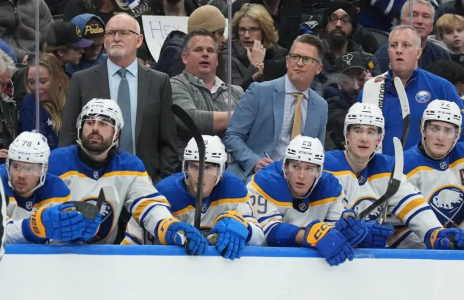
Sabres’ NHL-record playoff drought hits 14 years: What went wrong this season?
The Sabres are are now tied with the New York Jets for the longest active playoff drought in pro sports.

The Buffalo Sabres have been eliminated from the playoffs, extending their NHL-record playoff drought to 14 seasons. They are now tied with the New York Jets for the longest active playoff drought in pro sports.
The Sabres’ elimination became official on Tuesday when the Montreal Canadiens beat the Detroit Red Wings. Even though the Sabres beat the Carolina Hurricanes on Tuesday and have won 10 of their last 13 games, they can no longer catch the Canadiens in the standings.
“We have work to do. We have work to do as a team, establishing the way we need to play, the way we need to manage the puck night in, night out, shift after shift,” coach Lindy Ruff said. “To become a better team, you have to take every period, every game you’re playing right now and use it as a stepping stone.”
This outcome has been inevitable for the Sabres since midseason. The Sabres had a 13-game winless streak in December that sank them to last place in the Eastern Conference, where they stayed for more than three months.
“It’s mixed emotions for sure. Pissed that we started to play good now. It’s too late. But also, it’s good that we can see we can play good hockey and we can beat any team in this league. I guess we have to build for next year and this is how you do it. This is the right way to do it,” captain Rasmus Dahlin said.
Buffalo last played a playoff game in April 2011. In that time, every NHL franchise, including the expansion Seattle Kraken, has played at least 14 playoff games. Thirty teams have played at least 25 playoff games, 21 teams have played at least 60 and seven teams have played more than 100 in the time since the Sabres last appeared in the playoffs.
The Sabres came into this season with internal playoff expectations. They brought back Ruff, a franchise legend, to coach the team, and he made it clear he thought this was a “win-now” situation. The Sabres bought out Jeff Skinner in the offseason and brought in five new forwards for their bottom two lines. But that wasn’t enough to move the needle for a team that finished with 84 points last season. The Sabres entered the season with more than $6 million in unspent cap space and with the youngest roster by average age in the NHL.
After a slow start, the Sabres clawed their way into playoff position by Thanksgiving. But they unraveled during the 13-game winless streak and were never able to recover. Dahlin missed nine games during that streak. Meanwhile, general manager Kevyn Adams did nothing to change the roster as the losses piled up.
“Could I or should I have done something?” Adams said after the trade deadline. “I think a lot about it. But then on the flip side, I think, but there’s a maybe, there’s a sometimes the short-term jolt that can maybe not be the best thing long-term. And I beat myself up. Did I miss something?”
The result was a team that was out of the playoff race before Jan. 1.
The Sabres’ inexperience showed throughout the season. A year after Ukko-Pekka Luukkonen had a breakout season in net, the Sabres’ team save percentage is the second worst in the NHL. They have the seventh most goals in the NHL but the fourth most goals against. They have the 25th-ranked power play in the NHL and the 23rd-ranked penalty kill. They have the third most first-period goals in the NHL but a minus-32 goal differential in the second and third periods.
This season should lead to more changes this summer. Adams got that started early at the deadline by trading center Dylan Cozens to the Ottawa Senators as part of a trade that included center Josh Norris coming the other way. But Norris played in only three games before missing the last few weeks with an injury.
There are more questions facing this team, though. This was the fifth season with Adams as general manager. The Sabres not only haven’t made the playoffs during his tenure, they’ve also regressed in each of the last two seasons. Owner Terry Pegula was in attendance on Tuesday to see the team get eliminated. He’s owned the team for 14 full seasons, and the team has missed the playoffs in every one. In that time, he’s employed four different general managers and seven coaches. Whether he wants to make another change remains to be seen, but both Ruff and Adams have one more year left on their respective contracts.
Buffalo’s roster is also going to need work. JJ Peterka, Bowen Byram, Ryan McLeod and Jack Quinn are all restricted free agents. So is Devon Levi, who is in the AHL but has a chance to be the Sabres’ backup goalie next season. The Sabres haven’t spent to the salary cap ceiling since the COVID-shortened 2019-20 season, but they may be pressed to do so if they hope to stop this drought at 14 seasons.
The losing has taken a toll on a fan base that has historically helped Buffalo punch above its weight as the second-smallest market in the NHL. The Sabres’ attendance ranks second-to-last in the NHL in average capacity this season.
“We know where we’re at. I’m disappointed with where we’re at. We can’t do anything about that, but we can work on our game. And we’re going to continue to work on our game until it’s over,” Ruff said.
